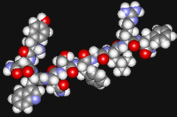Kisspeptin Increases Luteinizing Hormone Secretion in Food Deprived D-Lys3-GHRP6-Treated Rats
DOI:
https://doi.org/10.31661/gmj.v6i1.811Keywords:
Kisspeptin, D-Lys3 -GHRP-6, Food Deprivation, Luteinizing HormoneAbstract
Background: Kisspeptin stimulatesthe reproductive axis while food deprivation or ghrelin inhibits it. The aim of the study was to determine the effects of third cerebral ventricle injection of kisspeptin on mean plasma luteinizing hormone (LH) levels in food deprived D-Lys3-GHRP6-treated rats. Materials and Methods: In this experimental study, five fed rats received third cerebral ventricular injection of salineat 09:00- 09:30 h. Also, twenty food deprived rats in four groups (n=5 in each group) received third cerebral ventricular injection of saline, kisspeptin(1nmol), D-Lys3–GHRP-6 (20nmol) or D-Lys3-GHRP-6 (20nmol) and kisspeptin(1nmol). Blood samples were collected via the tail vein. Plasma LH concentration was measuredby using LH kit and the method of radioimmunoassay (RIA). Results: Mean plasma LH level in food-deprived rats decreased significantly compared to fed rats. Kisspeptin significantly increased the mean plasma LH concentrationcompared to fed or food deprived saline group. Injection of kisspeptin in D-Lys3 -GHRP-6-pre-treated rats significantly increased the mean plasma LH concentration compared to fed saline, food deprived saline, alone kisspeptin or alone D-Lys3 -GHRP-6 groups. Conclusion: Decrease of ghrelin pathway activity may partly be involved in the mediating the stimulatory effects of kisspeptin on hypothalamic-pituitary-gonadal axis. [GMJ. 2017;6(1):39-43]








